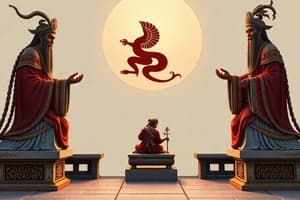Podcast
Questions and Answers
What is the fundamental principle emphasized in Daoism that underlies the universe?
What is the fundamental principle emphasized in Daoism that underlies the universe?
- Dao (Tao) (correct)
- Wu Wei
- Yin and Yang
- Qi Gong
Which concept in Daoism refers to the practice of 'non-action' or 'effortless action'?
Which concept in Daoism refers to the practice of 'non-action' or 'effortless action'?
- Qi
- Zhuangzi
- Wu Wei (correct)
- Tai Chi
Which of the following texts is attributed to Laozi, a significant figure in Daoism?
Which of the following texts is attributed to Laozi, a significant figure in Daoism?
- Nineteen Old Poems
- Dao De Jing (correct)
- Huainanzi
- Taiping Jing
What dualistic concept in Daoism symbolizes the interconnected and interdependent nature of reality?
What dualistic concept in Daoism symbolizes the interconnected and interdependent nature of reality?
Which practice involves exercises aimed at cultivating vital energy (Qi) in the body?
Which practice involves exercises aimed at cultivating vital energy (Qi) in the body?
Flashcards are hidden until you start studying
Study Notes
What is Daoism
-
Definition: Daoism, also known as Taoism, is a philosophical and religious tradition from China that emphasizes living in harmony with the Dao (Tao), which is understood as the fundamental principle that underlies and unifies the universe.
-
Key Concepts:
- Dao (Tao): The ultimate source and principle of the universe; the way of nature.
- Wu Wei: A fundamental principle meaning "non-action" or "effortless action"; promoting harmony with the natural flow of life.
- Yin and Yang: Symbolizes the dual nature of reality, with complementary forces that are interconnected and interdependent.
-
Historical Background:
- Origins: Daoism dates back to the 4th century BCE with texts like the "Dao De Jing" attributed to Laozi and the "Zhuangzi" attributed to Zhuang Zhou.
- Evolution: Developed from early folk religions, and later incorporated elements from Buddhism.
-
Core Teachings:
- Emphasizes simplicity, humility, and compassion.
- Advocates for a lifestyle aligned with nature and the Dao.
- Encourages meditation, contemplation, and the cultivation of one's inner life.
-
Practices:
- Meditation: Various forms aimed at stilling the mind and connecting with the Dao.
- Tai Chi: A martial art that embodies Daoist principles, promoting balance and harmony.
- Qi Gong: Exercises focused on cultivating vital energy (Qi) in the body.
-
Influence:
- A major philosophical school in Chinese culture, influencing art, politics, and science.
- Interactions with Confucianism and Buddhism, leading to syncretic practices.
-
Modern Relevance:
- Continues to be practiced in various forms around the world, influencing contemporary spirituality and environmentalism.
Definition and Key Concepts
- Daoism, or Taoism, originated in China focusing on harmony with the Dao, the fundamental principle unifying the universe.
- Dao (Tao) refers to the ultimate source and guiding force of the universe, embodying the essence of nature.
- Wu Wei translates to "non-action," advocating for effortless action in accordance with the natural flow of life.
- Yin and Yang represent duality in reality, illustrating interconnected and interdependent complementary forces.
Historical Background
- Daoism's roots trace back to the 4th century BCE, with foundational texts such as the "Dao De Jing" attributed to Laozi and the "Zhuangzi" connected to Zhuang Zhou.
- The tradition evolved from early folk religions, integrating elements from Buddhism over time.
Core Teachings
- Key principles include simplicity, humility, and compassion, promoting a lifestyle that aligns with nature and the Dao.
- Encourages practices like meditation and contemplation, fostering the development of one's inner life.
Practices
- Meditation: A variety of methods intended to still the mind and deepen connection with the Dao.
- Tai Chi: A martial art practice reflecting Daoist philosophies, focusing on balance and harmony within movement.
- Qi Gong: A series of exercises designed to cultivate and enhance vital energy (Qi) within the body.
Influence and Modern Relevance
- Daoism is a significant philosophical influence in Chinese culture, shaping artistic expressions, political thought, and scientific approaches.
- Interactions with Confucianism and Buddhism resulted in syncretic practices that enriched the tradition.
- Continues to thrive globally, inspiring contemporary spiritual practices and environmental awareness.
Studying That Suits You
Use AI to generate personalized quizzes and flashcards to suit your learning preferences.





